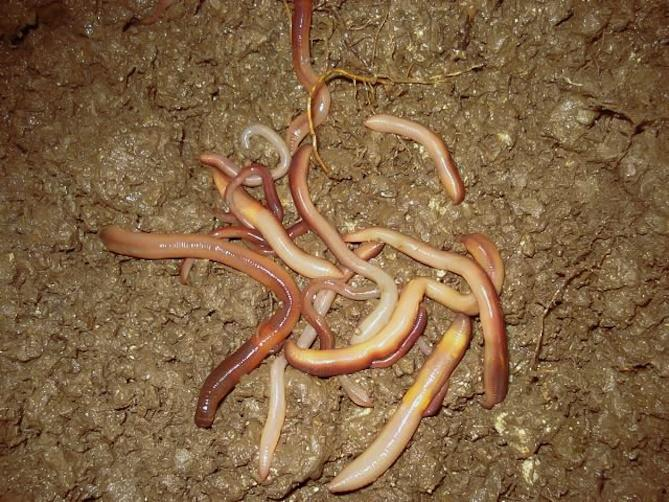
Why is earthworm considered a farmer’s friend? Explain humification and mineralisation occurring in a decomposition cycle.
Answer
601.2k+ views
Hint: It is a reddish-brown terrestrial invertebrate that lives in the upper layer of the moist soil. It has a segmented body and belongs to phylum Annelida.
Complete answer
Earthworms make burrows in the soil and make it porous which helps in respiration and penetration of the developing plant roots and hence, are called farmer’s friends. They have the capability to maintain the fertility of the soil and hence, play a crucial role in sustainability. Earthworms are one of the most important soil animals and are potentially useful for the management of biodiversity and ecosystem services.
Role of earthworm in farming includes:
- Earthworms preserve the Physico-chemical properties of the soil by converting the biodegradable materials and organic wastes into nutrient-rich products.
- They are emerging from their burrows to deposit the fecal matter called vermicast on the surface.
- Earthworms promote microbial activity, mix and aggregate the soil, maintain soil water content.
- The mutual action of earthworms and microbes brings faster decomposition as the earthworm’s condition, aerate, fragment, and enhance the surface area of the organic matter for microbial action.
- They enhance the litter decomposition, nutrient cycles, promote plant growth, soil organic matter dynamics, and reduce soil-borne diseases.
Humification: It is defined as the process of decomposition of dead organic matter that leads to the formation of humus.
Mineralization: It is the process of further degradation of humus by the help of microbes resulting in the release of the inorganic substance into the soil. Mineralization increases the bioavailability of the nutrients that were initially present in decomposing organic matter.
Note: Immobilization is the opposite of Mineralization and it involves the conversion of inorganic compounds to organic compounds by micro-organisms or plants.
Earthworms are also used as bait in game fishing.

Figure: Earthworms in soil
Complete answer
Earthworms make burrows in the soil and make it porous which helps in respiration and penetration of the developing plant roots and hence, are called farmer’s friends. They have the capability to maintain the fertility of the soil and hence, play a crucial role in sustainability. Earthworms are one of the most important soil animals and are potentially useful for the management of biodiversity and ecosystem services.
Role of earthworm in farming includes:
- Earthworms preserve the Physico-chemical properties of the soil by converting the biodegradable materials and organic wastes into nutrient-rich products.
- They are emerging from their burrows to deposit the fecal matter called vermicast on the surface.
- Earthworms promote microbial activity, mix and aggregate the soil, maintain soil water content.
- The mutual action of earthworms and microbes brings faster decomposition as the earthworm’s condition, aerate, fragment, and enhance the surface area of the organic matter for microbial action.
- They enhance the litter decomposition, nutrient cycles, promote plant growth, soil organic matter dynamics, and reduce soil-borne diseases.
Humification: It is defined as the process of decomposition of dead organic matter that leads to the formation of humus.
Mineralization: It is the process of further degradation of humus by the help of microbes resulting in the release of the inorganic substance into the soil. Mineralization increases the bioavailability of the nutrients that were initially present in decomposing organic matter.
Note: Immobilization is the opposite of Mineralization and it involves the conversion of inorganic compounds to organic compounds by micro-organisms or plants.
Earthworms are also used as bait in game fishing.

Figure: Earthworms in soil
Recently Updated Pages
Master Class 12 Economics: Engaging Questions & Answers for Success

Master Class 12 Physics: Engaging Questions & Answers for Success

Master Class 12 English: Engaging Questions & Answers for Success

Master Class 12 Social Science: Engaging Questions & Answers for Success

Master Class 12 Maths: Engaging Questions & Answers for Success

Master Class 12 Business Studies: Engaging Questions & Answers for Success

Trending doubts
Which are the Top 10 Largest Countries of the World?

What are the major means of transport Explain each class 12 social science CBSE

Draw a labelled sketch of the human eye class 12 physics CBSE

Why cannot DNA pass through cell membranes class 12 biology CBSE

Differentiate between insitu conservation and exsitu class 12 biology CBSE

Draw a neat and well labeled diagram of TS of ovary class 12 biology CBSE




